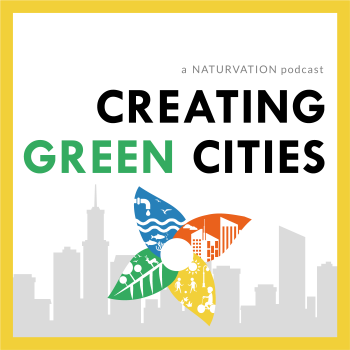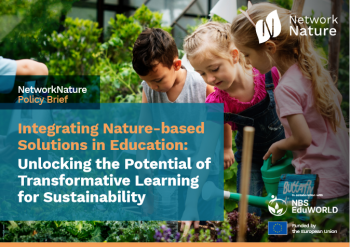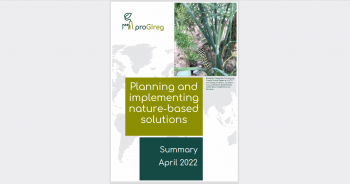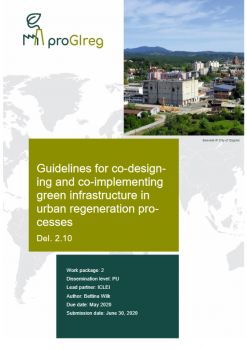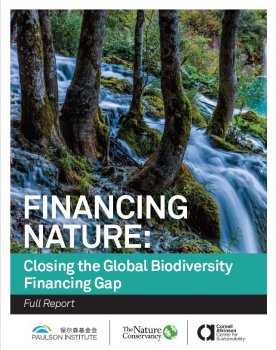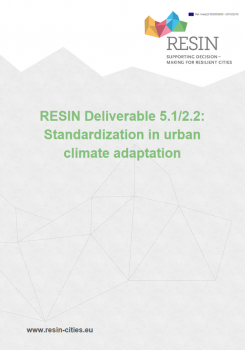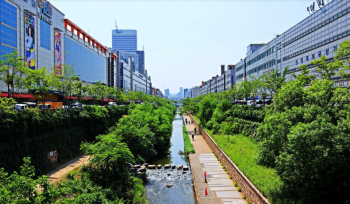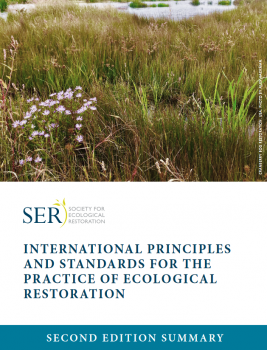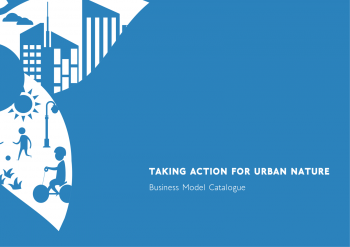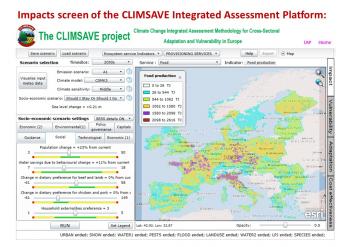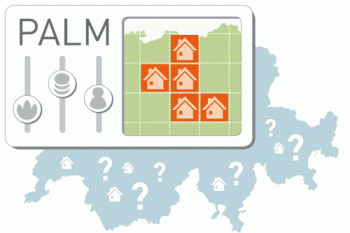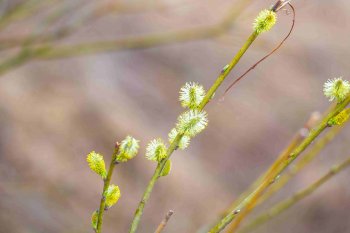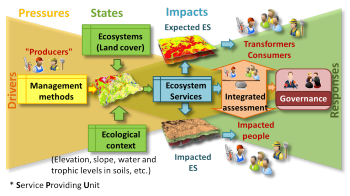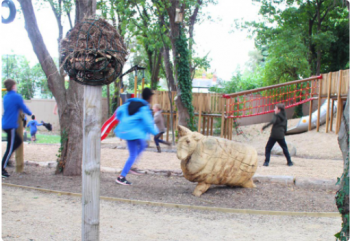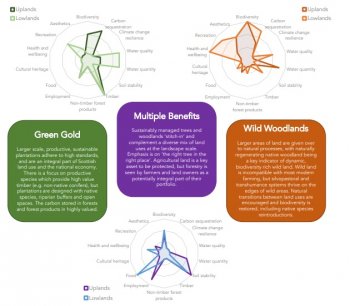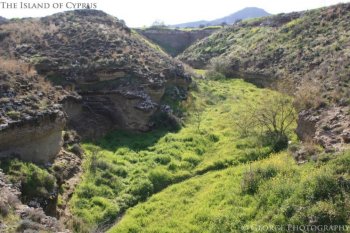Marketplace
Podcast: Creating Green Cities
Creating Green Cities is a podcast on urban-nature based solutions, explained through stories of inspiring innovators from across Europe who have used their passion and creativity to make cities greener. We talk to guests from Barcelona, Budapest, Malmö and Utrecht to find out why green roofs are
Integrating Nature-based Solutions in Education: Unlocking the Potential of Transformative Learning for Sustainability
This policy brief provides a timely and brief overview of the current policy incentives for NbS and sustainability education in Europe, identifies key barriers and opportunities in supporting education systems in taking up NbS education and offers key recommendations for policy makers, educators,
Planning and implementing nature-based solutions - summary
This report is a summary of the proGIreg project's efforts in planning and implementing nature-based solutions, the summary is derived from in-depth reports linked to the end of each chapter. Explore the reports to learn more!
Guidelines for co-designing and co-implementing green infrastructure in urban regeneration processes proGIreg Del. 2.10
These practical guidelines offer general and transferrable guidance on how to initiate, steer and organize collaborative co-design processes for local NbS, together with multi-dimensionalstakeholders in any given city. They target anyone aiming to lead, organise or facilitate
FINANCING NATURE: Closing the Global Biodiversity Financing Gap
The report identifies a set of nine financial and policy mechanisms that, if implemented and scaled up, can collectively close the biodiversity financing gap. The report goes into detail about the enabling conditions for the implementation and scaling of each of these mechanisms, and it makes
Standardization in urban climate adaptation
The RESIN project has developed standardised approaches to help cities develop their adaptation strategies and strengthen their resilience. Key products are: A tool for impact and vulnerability analysis (IVAVIA1); a decision support tool (E-Guide); a library of adaptation options;
ZÖLD-KÉK INFRASTRUKTÚRA: Városi kékinfrastruktúra, városi zöldinfrastruktúra jógyakorlatok
A Szent István Egyetem Tájépítészeti és Településtervezési kara által az URBACT BINIR projekt keretén belül készített összefoglaló anyag. A zöldinfrastruktúrának nem csak az ökoszísztémára van pozitív hatása, hanem a társadalom egészségi állapotára, a település gazdasági vonzerejére, valamint az
International principles and standards for the practice of ecological restoration
This summary provides an abbreviated outline and introduction to the full SER International Principles and Standards for the Practice of Ecological Restoration, Second Edition to: better understand how the principles and standards relate to each other; apply these concepts at all stages of a
How to tell your city’s story Connecting Nature Framework - Sarajevo –
The development of a resilient city pleasant for the life of citizens of all ages and meeting their needs is one of the goals of the city. Thus, within the project, the Sarajevo exemplar was created, as first nature-based solution, which will provide the inhabitants of the city a place for
Taking Action for Urban Nature - Business Model Catalogue for Urban NbS
The Business Models Catalogue for urban nature-based solutions presents eight different business models for urban nature-based solutions. These were identified based on 54 in-depth case studies of urban nature-based solutions, both in- and outside of Europe. These models explain which values
CLIMSAVE Integrated Assessment Platform
The CLIMSAVE Integrated Assessment Platform is a user-friendly, interactive web-based tool that allows stakeholders to assess climate change impacts and vulnerabilities for a range of sectors, including agriculture, forests, biodiversity, coasts, water resources and urban development. The linked
PALM - Intercommunal potential analysis of the resource land for sustainable land management
The spatial decision support tool PALM aimed at supporting the allocation of urban development zones. A GIS-based MCDA approach was integrated into a web-based platform that allows distributing a requested amount of urban development areas within a selected perimeter based on ecosystem services and
Webinar: Ireland's Contribution to a Greener Future
The webinar "Ireland’s Contribution to a Greener Future", hosted by GoGreenRoutes on 16 March 2021, gathered Irish partners involved in EU H2020 and other funded research projects related to the environment, cities and health and well-being. The webinar opened with presentations from
- Document
Innovative tool to reduce the arduousness of technical planting operations: the redesigned planting pickaxe
Develop plantation management methods that meet the social and environmental expectations : characteristics of the planting tool to improve ergonomics and optimise the efficiency of the actions carried out by the operator
CHILDREN’S URBAN NATURE LAB IN VUORES
In April, a children’s urban nature lab was organised in Vuores, inviting children from day care centres, preschools and primary schools to participate in the development of nature-based systems in Vuores. The children learned about the role of basins and wetlands in water purification, the plants
Wal-ES Platform
Wal-ES is the walloon (Southern part of Belgium) platform on ecosystem services which aims to develop decision support tools based on this concept. During its one year of funding, Wal-ES set up the foundations for the development of these tools. A conceptual and an assessment frameworks have been
Providing contact with nature for young generation - A case study of preschools in the City of Poznań, Poland
Contact with nature is valuable for the health, wellbeing and development of children. Meanwhile, the urban environment and the contemporary urban lifestyle limit the opportunity for contact with nature. Given that children aged three to six years spend a significant amount of time in preschool, we
Understanding Stakeholder Values for Woodland Expansion - Briefing Note
Despite woodland expansion being advocated via a number of policy documents, barriers to woodland creation in Scotland remain. These include contested views about land use amongst multiple stakeholders, concerns around trade-offs with other land uses, and a lack of synergy between policies and
- Document
Carbon accounting for PES
The economic aspect of sustainable forest management is crucial for preserving rural areas, highlighting the need to develop methods for quantifying its ecosystem services.
Connecting Nature Framework Urban Green Network of Nicosia
Through Connecting Nature Framework, Nicosia Development Agency team aims to help delivering NbS as part of a strategic plan that places environmental objectives and healthy, attractive, and natural surroundings for the local population higher on development agendas. More specifically, Connecting
- ‹ previous
- 3 of 55
- next ›

